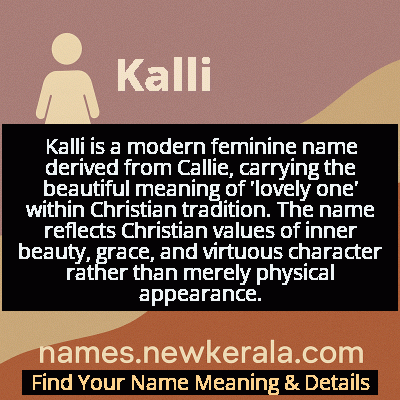Kalli Name Meaning & Details
Origin, Popularity, Numerology Analysis & Name Meaning of Kalli
Discover the origin, meaning, and cultural significance of the name KALLI. Delve into its historical roots and explore the lasting impact it has had on communities and traditions.
Name
Kalli
Gender
Female
Origin
Christian
Lucky Number
9
Meaning of the Name - Kalli
Kalli is a modern feminine name derived from Callie, carrying the beautiful meaning of 'lovely one' within Christian tradition. The name reflects Christian values of inner beauty, grace, and virtuous character rather than merely physical appearance.
Kalli - Complete Numerology Analysis
Your Numerology Number
Based on Pythagorean Numerology System
Ruling Planet
Mars
Positive Nature
Generous, passionate, energetic, and humanitarian.
Negative Traits
Impulsive, impatient, moody, and can be overly emotional.
Lucky Colours
Red, maroon, scarlet.
Lucky Days
Tuesday.
Lucky Stones
Red coral, garnet.
Harmony Numbers
1, 2, 3, 6.
Best Suited Professions
Military, sports, philanthropy, leadership roles.
What People Like About You
Courage, energy, leadership, generosity.
Famous People Named Kalli
Kalli Anderson
Journalist
Award-winning investigative journalist known for social justice reporting
Kalli Bunch
Beauty Queen
Miss Kentucky USA 2017 and prominent Christian youth advocate
Kalli Bissell
Musician
Christian worship leader and contemporary Christian music artist
Kalli B.
Social Media Influencer
Popular Christian lifestyle content creator with focus on family values
Name Variations & International Equivalents
Click on blue names to explore their detailed meanings. Gray names with will be available soon.
Cultural & Historical Significance
The name's cultural significance extends beyond mere preference to reflect changing attitudes within Christian communities about identity and self-expression. Where traditional Christian names often emphasized biblical figures or overtly religious meanings, names like Kalli represent a shift toward names that carry subtle spiritual connotations while fitting comfortably in secular contexts. This reflects the reality of many modern Christian families who navigate both faith communities and broader society. The name's gentle sound and positive meaning make it particularly appealing to parents who want a name that embodies Christian values of kindness and inner beauty without being overtly religious, allowing their child to carry their faith in a more integrated, natural way.
Extended Personality Analysis
Women named Kalli are often characterized by their remarkable balance of strength and gentleness, embodying the Christian ideal of being both courageous and compassionate. They typically possess natural leadership qualities tempered with humility, making them effective in both professional and personal relationships. Their creative problem-solving abilities often surprise others, as they approach challenges with both practical wisdom and innovative thinking. Kallis tend to be deeply loyal friends and family members, valuing authentic connections and investing significant energy in maintaining meaningful relationships. They often serve as emotional anchors in their social circles, providing stability and wisdom during difficult times while celebrating joys with genuine enthusiasm.
In professional settings, Kallis are known for their reliability and integrity, often earning trust quickly through consistent demonstration of their values. They typically excel in roles that require both empathy and determination, such as education, healthcare, counseling, or creative fields. Their natural curiosity drives continuous learning and growth, while their strong moral compass guides their decisions. Many Kallis develop deep spiritual lives that inform their worldview and approach to challenges. They often become pillars in their communities, known for their willingness to help others and their ability to see the best in people. Despite their many strengths, they typically remain grounded and approachable, never letting accomplishments diminish their inherent warmth and accessibility.
Modern Usage & Popularity
In contemporary naming practices, Kalli occupies a unique space as a name that feels both fresh and familiar to modern parents. Its usage has remained consistent rather than experiencing dramatic spikes in popularity, making it a reliable choice for parents seeking a name that is recognizable but not overly common. The name sees strongest usage among Christian families who appreciate its connection to traditional values through its root meaning while embracing the modern spelling as a form of individual expression. Current naming trends show Kalli being chosen by parents who value both phonetic simplicity and distinctive spelling, allowing their daughter to have a name that is easy to pronounce but visually unique. The name's versatility makes it suitable for various professional and personal contexts, appealing to parents who want a name that will serve their child well throughout life stages. Its moderate popularity ensures that while a child named Kalli won't be one of multiple in her classroom, the name remains accessible and easily understood across generations and cultural contexts.
Symbolic & Spiritual Meanings
Symbolically, Kalli represents the beautiful intersection of tradition and innovation that characterizes much of modern Christian life. The name embodies the concept of 'beauty in transformation' – suggesting that true beauty emerges through growth and adaptation while maintaining core values. In Christian symbolism, the name connects to themes of grace, redemption, and the idea that inner character matters more than external appearance. The modern 'K' spelling symbolizes the courage to honor tradition while embracing personal identity, reflecting the Christian journey of becoming one's authentic self while remaining rooted in faith. The name also carries symbolic weight as a bridge between generations – honoring the past through its traditional meaning while looking toward the future through its contemporary presentation. This duality makes Kalli symbolically rich, representing the ongoing dialogue between heritage and progress that defines many aspects of contemporary Christian experience and identity formation.

